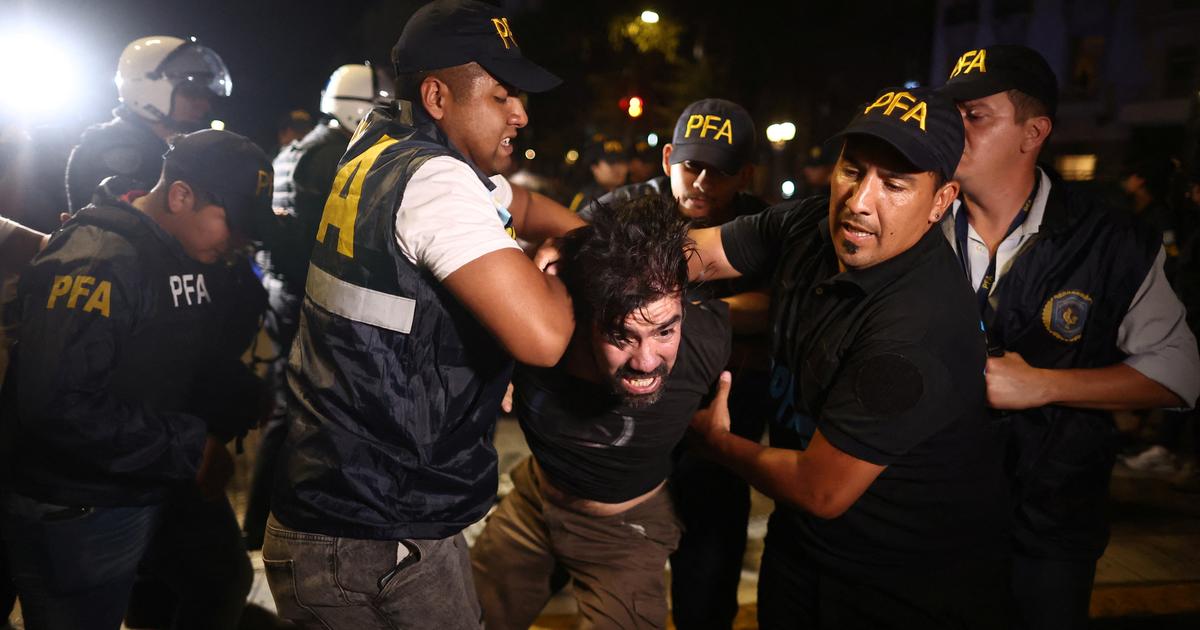The street disrupted the parliamentary debate on the reforms of ultraliberal President Javier Milei in Argentina, where the examination of this very controversial project resumes on Friday, the day after the brilliant coup of the opposition deputies who momentarily left the hemicycle to denounce the
“repression”
of a demonstration by the police.
Thursday evening, the police fired rubber bullets, also using water cannons and tear gas, to disperse hundreds of demonstrators and clear traffic routes around Parliament, AFP noted .
Several stampedes took place but without degenerating into violent clashes.
Argentine media reported three injuries and two arrests, without initial official confirmation.
The Buenos Aires press union, SiPreBA, for its part, identified around fifteen journalists hit by rubber bullets, including one in the face.
A “dangerous repressive advance fueled by the executive”
Since Wednesday, parliamentarians have been examining Javier Milei's vast and controversial set of deregulatory reforms, which affects many aspects of the economy and the public and private spheres, during marathon sessions.
The debate takes place against a backdrop of tension maintained outside by demonstrators mobilized at the call of radical left movements mainly in the face of an imposing police force.
MPs from opposition parties, particularly from the left, went outside on Thursday evening to observe the incidents.
“We cannot sit this way
,” said MP Mariano Del Caño.
The moderate opposition party UCR (center-right) had previously warned of a
“dangerous repressive advance fueled by the executive”
.
Returning to the hemicycle, they asked in vain for an adjournment of the debate, which continued until after midnight.
The elected Peronist Maximo Kirchner, son of ex-president Cristina Kirchner, justified their exit to
“take 40 minutes, in order to avoid deaths and tragedies”
Alejandro Finocchiaro, deputy allied with the government, accused them of maneuvering with the demonstrators to
“end this session”
of parliament.
“Outside, there are no workers, if there were workers, they would not be 48 hours without doing anything
,” he mocked.
After a still tense face-to-face late Thursday evening between clusters of demonstrators and police lines who tried to keep them on the sidewalks, the area around Parliament was emptied around midnight.
On Wednesday, a demonstration of several thousand people got out of hand in the evening, leading the police to use tear gas.
Six people were arrested and all released on Thursday.
A ruling party MP also reported a police officer lightly injured on Wednesday.
The “fear of giving absolute power” to Milei
Excessive, with 664 articles in its initial version, President Milei's reform package, called the
"omnibus law"
, was unraveled through parliamentary negotiations, in committees, and according to legislative sources in the press, would only include 224 provisions.
Two aspects in particular generate resistance: the extent of privatizations, with 40 companies targeted, and the delegation of increased powers to the executive, for a limited period, in the name of
"economic emergency"
, in matters of tariffs, energy, tax in particular.
The opposition fears that this would allow reforms to be imposed by decree that Parliament would have rejected.
A Peronist opposition deputy (left), Anibal Cisneros, expressed
“the fear of giving absolute powers”
to Milei who
“we do not know if he will not wake up angry tomorrow and declare war on Chile, in Peru or China
.
Damian Arabia, a member of the liberal right-wing opposition allied with Milei's minority party (third force in parliament), urged the House to vote for the reforms
"because what is at stake is governability"
.
President Milei has assured since coming to power almost two months ago that there is
“no plan B”
, no alternative to austerity and deregulation, to stabilize a structurally indebted economy, and drunk with record inflation of 211% over one year.
After an adjournment past midnight, the deputies were to resume the debate Friday morning, with a view to a first vote on the principle of the law, before examining the articles in detail.

